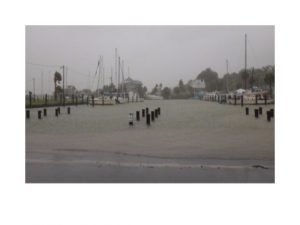
Coastal communities increasingly realize the need for adaptation strategies, but many are unsure where to begin. This intensive and interactive course provides individuals with a thorough grounding and practical skills for incorporating adaptation strategies into planning processes. Time in class is provided to practice applying what you learn, and opportunities for local collaboration and next steps are emphasized through discussion, participant activities, and local speakers and examples.
Adaptation Planning Tickets at Eventbrite
Continuing education credits are available through the American Planning Association and the Association of State Floodplain Managers.
You will learn how to
- Apply the basic elements of an adaptation planning framework to organize future preparedness efforts
- Translate climate science into impacts on local community assets
- Practice a qualitative approach to scope and compile a vulnerability assessment, and describe how to apply the results
- Identify, compare, and prioritize locally relevant adaptation strategies and actions
- Describe implementation options for different strategies
- Recognize the importance of stakeholder involvement in adaptation planning and demonstrate the applicability of engagement processes and tools
Getting Started
Trainers introduce the adaptation planning framework that provides the foundation of the training.
Participants will:
- Lean about others in the room and their work in adaptation
- Discuss what local circumstances might be present to support or hinder adaptation efforts
- Brainstorm key community assets
- Identify relevant stakeholders to engage for assets being discussed
Climate and Impacts
Local experts share the latest science on the regional climate trends, observations, and projections for the future. Trainers discuss the role uncertainty can play in adaptation planning, and how scenario planning is a useful tool in moving beyond the challenges of making decisions in light of unknowns.
Participants will:
- Discuss their own observations of changes in the physical environment
- Apply information on climate impacts to an asset of their choice
- Describe the potential consequences of climate stressors to the resilience of the community
Assessing Vulnerability
A local speaker shares their experiences vulnerability assessments. Trainers introduce the basic components of vulnerability, the range of assessment types, and how assessments support the planning process.
Participants will:
- Develop a plan for conducting a vulnerability assessment for an asset of their choice
- Learn about different sources and types of vulnerability for assets across sectors
- Work through a qualitative vulnerability assessment in a collaborative setting
- Learn about the importance and challenges in communicating assessment results
- Discuss how to use the information gathered in an assessment to begin considering adaptation actions
Strategies and Actions
A local speaker will share insights on their experience in developing and implementing adaptation strategies and actions.
Participants will:
- Learn about of a variety of adaptation strategies used by coastal communities
- Identify adaptation strategies for specific assets
- Describe factors that contribute to the feasibility of strategies
Selecting and Implementing
Trainers share examples of methods used for analyzing and prioritizing adaptation actions, as well as key components of implementation plans.
Participants will:
- Assess and prioritize the list of actions developed in an earlier activity using selected criteria
- Develop an implementation plan for an adaptation strategy.
- Share commitments for applying what they’ve learned to move forward with adaptation
 0
0
